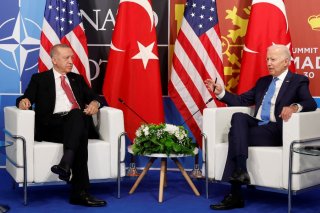Biden Should Kill TurkStream to Promote Transatlantic Energy Security
Biden should give trans-Turkish energy corridors the same treatment he ultimately gave Nord Stream 2, and for the same reasons.
When Russia’s Gazprom and its European partners announced plans for the Nord Stream 2 pipeline to bring Russian gas directly to Germany, eight European Union (EU) members and the Obama administration objected. They understood that Nord Stream 2’s operation would give the Kremlin leverage over Europe and also enable it to isolate Ukraine, which remains dependent on outside energy. Condemnation did little to slow the project. Germany craved gas without consideration of the strategic costs.
Secretary of State Mike Pompeo had little patience for that tack. He understood that a greater reliance on Russian gas would leave the West vulnerable and therefore removed sanctions exemptions. Nord Stream 2 stalled until President Joe Biden lifted sanctions under the logic that ending objections to Germany’s pet project would repair U.S. relations with Europe and promote a transatlantic partnership against China. As Senator Ted Cruz (R-TX) pointed out presciently, the Kremlin would interpret lifting sanctions on Nord Stream 2 as a green light for aggression.
While Biden now understands the fallacy of increasing Russia’s share of the European energy sector, he appears blind to the broader lesson. Shortly after Russia invaded Ukraine, the Biden administration reversed Trump-era commitments to support the Eastern Mediterranean (EastMed) pipeline, supposedly because the State Department deemed it economically unfeasible.
There are three problems with this excuse: First, private sector assessments matter more than diplomats who have no business experience or financial stake in the project. Second, while pipelines across Turkey may be cheaper if they only transport gas, the EastMed pipeline that would ship gas from Israel and Cyprus to Europe bypassing Russia, Turkey, and Iran, could also support Cypriot development of green hydrogen fuel. A greater initial investment provides longer-term rewards. Finally, as Turkey threatens a war of aggression against fellow NATO member Greece, Biden ignores the peril of swapping reliance on one dictator with another.
It is time for an about-face. The bipartisan Eastern Mediterranean Security and Energy Partnership Act of 2019 declared, “It is in the national security interest of the United States to promote, achieve, and maintain energy security among, and through cooperation with, allies.” It endorsed the EastMed pipeline and the infrastructure of other energy infrastructure to Europe; called for Greece, Cyprus, Israel, and the United States to enhance their partnership and cooperation on energy production; and charged the Department of Energy to create U.S.-Eastern Mediterranean Energy Center in the United States to further research into innovative energy technology and water science. The Euro-Asia Interconnector, the longest submerged power cable in the world, is already under construction and will link Israel’s power grid to Europe. Unlike corridors that Turkey now promotes, the interconnector is a multi-use plug-in infrastructure that can accommodate electricity generated in multiple ways and from multiple sources. It passes progressives’ climate change criteria.
Part of the strategic wisdom of the East-Med partnership is its carrots-and-sticks approach. It pushed the State Department to support U.S. partnership in the Eastern Mediterranean Natural Gas Forum, but it also omitted Turkey so long as it remained an autocratic and destabilizing force in the region, an approach from which the State Department shied away in the name of promoting inclusion. This ties reform in Ankara to financial benefit rather than rewards recalcitrance. As ExxonMobil continues to find significant gas reserves off of Cyprus, the State Department’s efforts to give Turkey a voice in Cypriot gas are counterproductive for two reasons. First, it legitimizes Turkey's maritime claims and its illegal occupation of northern Cyprus. Second, it encourages ongoing irredentism toward Greece by signaling that persistence trumps truth when making illegal territorial grabs.
Today, Turkish officials brag that they will double the transit of gas and oil to Europe. Ironically, they plan to do this by laundering Russia’s hydrocarbon investments, bolstering the Azerbaijani dictatorship, and empowering Iran.
The simple fact is that any new or enhanced TurkStream is as bad an idea as Nord Stream. It encourages both Turkey and Azerbaijan, regimes not content to live within their borders, and makes European democracies prone to hostile regimes’ blackmail.
The first consideration for the Mediterranean’s new energy projects should be that they do no harm to the United States and its allies. Biden should give trans-Turkish energy corridors the same treatment he ultimately gave Nord Stream 2, and for the same reasons.
Michael Rubin is a senior fellow at the American Enterprise Institute. You can follow him on Twitter: @mrubin1971.
Image: Reuters.

